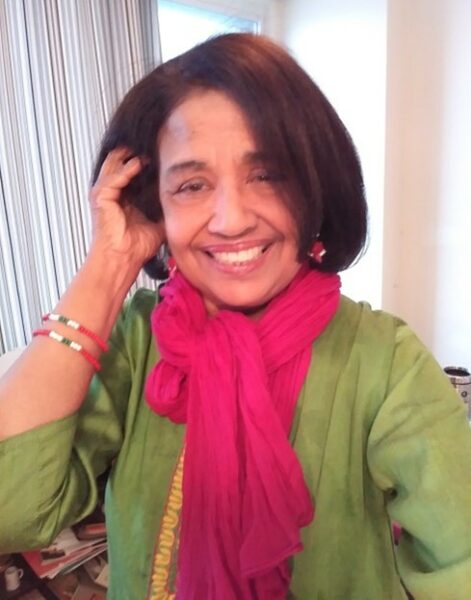
Susan Korah is an award-winning Canadian journalist and long-time member and friend of the Media Club who reports on national and international news. She is also a part time blogger who loves to share her intriguing and unique travel experiences. In this article, she reflects on her last exciting travel adventure before the pandemic struck the world.
It was a sudden, dramatic turn of events, perhaps as historically significant as the French Revolution of 1789 that changed a country forever. Except that this was not in the streets of Paris, but in the streets of Beirut, once described as the Paris of the Middle East—and I was caught in the thick of it.
It was October 18, 2019. The tension in the lobby of the Casa D’Or Hotel in the Hamra neighborhood of Lebanon’s capital was palpable. Guests were milling around the lobby, checking their cell phones, while keeping one eye on the large TV monitor that dominated one wall of the lounge.
I am a journalist from Canada, and I was typing my notes from an international conference I had attended just two days before. At the same time, I was trying to understand the Arabic news anchor whose voice rose from time to time in a shrill falsetto, and then dropped to a breathless whisper.
My cell phone beeped. It was a message from my Lebanese friend Marie whom I was expecting to meet up with in just a couple of hours. She had promised to show me around Beirut after my four days of work. But now her message warned me to stay in the hotel, and not to venture out, because “something” was happening in the streets, and it would be too risky to get out!
Soon, the blare of car horns and the rhythmic chanting of young people in the street outside my hotel reached my ears. I looked out the window to see that seemed like a happy street party. But I was wrong!
The ‘party’ which was no less than an anti-government protest that soon turned into violence. Tens of thousands of people from across Lebanon were pouring into the streets in a frenzy of flag waving and slogan- chanting in unison. They were venting their pent-up frustration and fury with a government they accused of being corrupt to the extreme, living off the fat of the land while the average citizen was struggling to make ends meet.
It was something like Marie Antoinette, wife of the French Emperor Louis VI, who supposedly responded to her starving peoples’ cry for help with the callous comment that if they didn’t have bread, they could eat cake! That was in France at some point in 1789, and the story ended with the dramatic end to her husband’s reign.
But this was 2019 and the people of Lebanon- from across the religious and sectarian spectrum of the country– were no less furious with a political elite that lived in pampered luxury, while bringing the economy of the country to the brink of collapse.
I am fairly knowledgeable about Middle Eastern politics, but I had obviously not read the tea leaves correctly in this case. But neither had the political elite of Lebanon, cocooned as they were in their marble mansions along the city’s Mediterranean coast, flying away from time to mingle with the rich and powerful social butterflies of the international jet set.
They were obviously caught by stunned surprise. But they acted quickly.
Riot police in vehicles and on foot rounded up protesters, firing rubber bullets and teargas canisters, dispersing demonstrators in Beirut’s commercial district. Dozens of people were wounded and detained.
But the protestors refused to give up. The people of Lebanon were demanding no less than an end to the government led by President Michel Aoun and PM Saad Hariri.
Just four days before this volcanic eruption that threatened to topple the power structure and bring it crashing to the ground, I was covering an international conference in the glitzy Emirates room of the Hilton Habtoor, one of Beirut’s grandest hotels. Two of the main speakers were President Michel Aoun and Foreign Minister Gebran Bassil, who happens to be the son-in-law of Aoun.
Ironically, the theme of the conference was: ‘Lebanon: Homeland of Dialogue and Civilization.”
Speaker after speaker sang the praises of Lebanon as a model of diversity and pluralism, with all religious communities sharing power and living together in harmony.
The President and his son-in-law arrived at the hotel, and left after their speeches, surrounded by trappings similar to those of an imperial court. Followed by an entourage of “courtiers” (assistants) and flash-bulb popping camera crews, they appeared to be basking in glory, like rock stars after a concert.
Little did they anticipate the massive upheaval that was to follow. People of all faiths were indeed united and singing from the same song sheet- but not in any way that would have reinforced their complacency. They were accusing their leaders of monopolizing power and sharing it within the same closely-knit group rather than with the citizens they were supposed to represent.
As I watched from the lobby of the Hotel Casa D’Or– where I had opted to stay instead of at the opulent Hilton Habtoor– the riots took an even uglier turn. Some rioters were burning cars, throwing bombs, and most alarmingly, from the point of view of travellers, blocking the road to Rafic Hariri International airport.
As the hours ticked by, I felt a growing sense of panic within me. I had a flight to catch by 9:30 am the next day, and it looked as if I would never make it to the airport.
To calm my nerves, I started a conversation with a group of Italian tourists who were also anxiously watching the news in the lobby. They were intrigued to find that I was a solo traveller and a journalist to boot. They were a group of about 20 from various Italian cities such as Milan and Padua, and they had flights to catch the next morning as well. But they had a tour bus, a Lebanese driver and an Italian tour guide. They kindly offered me a ride to the airport in their bus, provided all went well and they had some assurance that they would make it there in safety.
We had to wait in uncertainty, until the Lebanese driver made a reconnaissance trip the airport in the dead of night, and then come back to report to us if the coast was clear.
At midnight I got another call on my cell phone. This time the news was good. “Be ready to leave the hotel at 1:00 am,” said Alessandro the tour guide.
The Italian tourists and I boarded the bus with our luggage at exactly an hour past midnight. We were on our way to the airport and to safety! As we reached the airport, all of us erupted into cheers as we hugged and thanked the driver, as if he were a knight in shining armour who had ridden to our rescue.
We camped out at the airport, sitting or reclining on our luggage, some of us waiting as long as 12 hours for our flights. My flight took off at 9:30 am, and I was soon in calm, peaceful Athens after a midnight escape from Beirut!
As my flight to Athens took off, I flipped through the pages of my notebook and found this quote from Anthony Bourdain, the master travel writer.
“Travel isn’t always pretty. It isn’t always comfortable. Sometimes it hurts, it even breaks your heart. But that’s okay. The journey changes you; it should change you. It leaves marks on your memory, on your consciousness, on your heart, and on your body. You take something with you. Hopefully, you leave something good behind.”
The Beirut adventure has not dampened my passion for travelling and writing stories that run deeper than sound bites and pithy headlines. It will forever remain etched in my memory.
Nowadays, I look back on it nostalgically, and keep hoping the pandemic will soon be behind us and I can travel again!
Enjoyed this article? Check Susan’s blog for more travel reflections.
